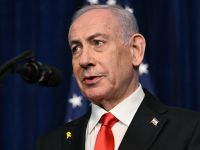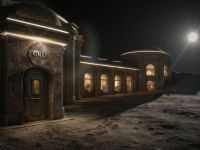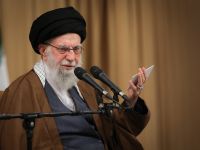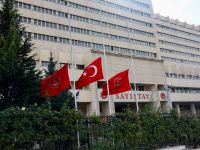Prime Minister Saad Hariri reiterated concerns Sunday that recent Israeli actions have indicated a desire for future conflict, as the Jewish state unveiled the latest addition to its multilayer missile defenses.
Hariri said that while he was opposed to Hezbollah’s actions in Syria, which he said affected Lebanon’s security, he was not concerned that the party might provoke a conflict with Israel.
“I think that Israel is the one that wants to launch a war against Lebanon, and not Hezbollah. Israel does not want the Arabs to rest. Look at the daily Israeli violations of our airspace, land and territorial waters,” he told France24 TV station as he arrived in Paris to meet with President Francois Hollande during a European visit.
“What Hezbollah is doing in Syria is wrong for me and right for them, we differ on that, but nothing that I would say would convince Hezbollah and [nor can they convince me],” the prime minister said
“There is no doubt that there is a radical political difference between us [Hariri’s Future Movement] and Hezbollah ... [but this is a] political dispute ... that doesn’t affect the management of the country,” the prime minister said.
Meanwhile, in Israel, Prime Minister Benjamin Netanyahu said Sunday that the latest addition to Israel’s missile defenses meant that those seeking to destroy the Jewish state would be endangering their own existence.
“Whoever seeks to strike us will be struck, whoever threatens our existence will place his own existence in jeopardy,” the Israeli prime minister said in a speech at a commissioning ceremony for the “David’s Sling” medium-range missile interceptor system, at Hatzor air force base in central Israel.
The new system is designed to intercept the type of medium-range missiles possessed by Hezbollah. Its unveiling marks the completion of Israel’s multitier system, which includes “the Arrow,” designed to intercept long-range ballistic missiles in the stratosphere with an eye to Iran’s capabilities, and “Iron Dome,” which defends against short-range rockets from the Gaza Strip.
The system became operational Sunday amid heightened tensions along Israel’s northern borders with Lebanon and Syria.
Last month, Israeli warplanes struck several targets in Syria that were thought to be a Hezbollah weapons convoy. The strikes drew retaliatory missile fire from Syrian forces, in the most serious incident between the two countries since the start of the Syrian civil war in 2011.
After Israel used its Arrow interceptor to destroy what was believed to have been a Russian-made SA-5 missile, Israeli Defense Minister Avigdor Lieberman threatened to destroy Syria’s air defense systems “without the slightest hesitation” if such an incident were to happened again.
Israel has sought to avoid being dragged into the Syrian conflict, but has carried out strikes within the country’s borders to stop what it says are deliveries of advanced weapons to Hezbollah.
While both Israeli intelligence assessments and Hezbollah leader Hasan Nasrallah’s recent comments suggest that a conflict between the two is unlikely in 2017, tensions have mounted alongside the increasingly aggressive rhetoric from Tel Aviv.
Israeli threats prompted the Lebanese government last month to task Foreign Minister Gebran Bassil with preparing a report for the U.N. Security Council regarding potential conflict.
Bassil was asked to prepare a “list of Israeli stances in media and a detailed letter to the Security Council to press the international community to uphold its responsibilities in the face of the intentional and public escalation [of the threat] to the region’s stability,” Hariri said during a Cabinet session held March 13.









